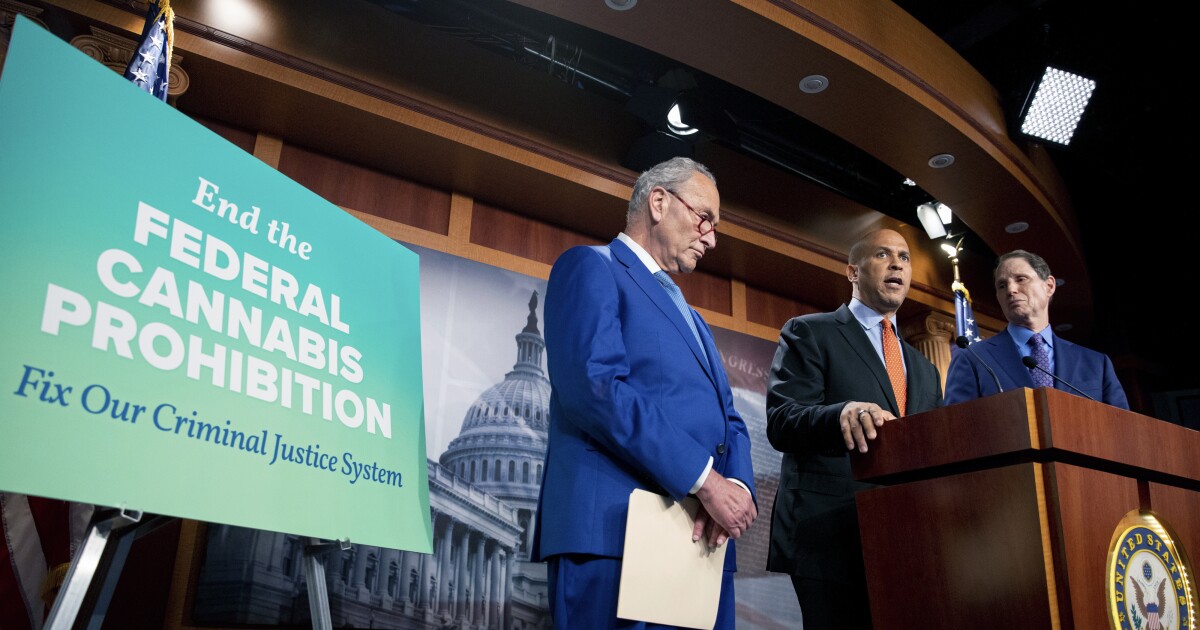

Senate Democrats unveiled their long-awaited marijuana legalization bill on Thursday, opening the door to future conversations on Capitol Hill about cannabis legalization despite its slim chances of being advanced in Congress.
Senate Majority Leader Chuck Schumer (D-NY) released his Cannabis Administration and Opportunity Act, which would decriminalize marijuana possession nationwide and allow states to enact their own laws without federal oversight. The legislation comes more than a year after Schumer proposed a draft of the bill and includes propositions that are backed by both parties.
SENATE HEARING ON CANNABIS PREVIEWS LONG-SHOT ODDS FOR DECRIMINALIZATION BILL
Here’s what the bill would do:
Decriminalize marijuana and expunge criminal records
Under the bill, anyone with a criminal record related to nonviolent federal marijuana offenses would have his or her record expunged and records sealed within one year of enactment. For those still serving sentences, the legislation would allow them to file for sentence review hearings. After those hearings, courts are instructed to “expunge each arrest, conviction, or adjudication of juvenile delinquency” for the offense, as well as vacate the current sentence.
The U.S. comptroller general would also be instructed to conduct a study examining the demographics for who is most likely to be convicted on federal marijuana charges to be shared with Congress.
Remove marijuana from the list of controlled substances
Marijuana would no longer be considered a controlled substance under federal law under the proposed legislation, as the bill would direct the attorney general to remove cannabis from the list of regulated substances within 60 days of enactment.
Cannabis would be removed from the Controlled Substances Act, which establishes which drugs must be regulated, and instead would be placed under the Federal Food, Drug, and Cosmetic Act. As a result, marijuana would be overseen by the Food and Drug Administration along with food, dietary supplements, and other substances such as tobacco.
Establish minimum age to purchase marijuana
Under the proposed bill, people seeking to purchase cannabis must be at least 21 years old. The legislation would also dictate how much a person can buy at once, limiting transactions to 10 ounces of cannabis.
The limit on how much one can purchase is intended to prevent “illegal actors” from buying cannabis in large quantities to traffic illegally into other states with stricter marijuana laws.
Allow some healthcare workers to recommend medical marijuana
If passed, the bill would reverse current law that prohibits healthcare workers for Veterans Affairs and the Indian Health Service from recommending patients to use medical marijuana. Instead, it would authorize physicians employed by both agencies to issue recommendations or opinions regarding the use of cannabis or drugs containing the substance.
Research marijuana’s effects on driving
The legislation would also direct the Departments of Transportation and Health and Human Services to research the effects of cannabis on driving so lawmakers can impose limits on impairment while operating vehicles.
The HHS, along with the Centers for Disease Control and Prevention, will also examine public health prevention strategies to raise awareness of the dangers of driving under the influence of marijuana and incentivize states to establish data systems to document impaired driving related to cannabis.
Other provisions
Among other provisions, the bill would create funding for law enforcement agencies to crack down on the illegal cultivation of marijuana, establish grants for small businesses seeking to enter the industry, and restrict marketing so it does not target minors.
The bill’s future
Although Schumer has long fought for marijuana legalization on the federal level, the bill faces an uphill battle in the Senate. Several lawmakers have pushed back on his efforts, arguing cannabis legalization opens the door to increased crime and drug use, despite his arguments that “overwhelming evidence” from states with legalized cannabis indicates there isn’t causality.
“The overwhelming evidence from the states that have legalized cannabis is there has not been an increase in crime and has not been an increase in drug use,” Schumer told reporters on Wednesday. “I think it makes a great deal of sense to legalize it.”
CLICK HERE TO READ MORE FROM THE WASHINGTON EXAMINER
Although Schumer’s bill has bleak chances, it’s likely lawmakers from both parties will take provisions from his framework to include in other legislation.
Nineteen states already allow anyone over 21 years old to purchase and use marijuana, and 37 states have programs that allow for the use of medical marijuana. Nearly 60% of voters say they support marijuana legalization, with 42% noting they believe those with previous criminal convictions for possessing the drug should be pardoned, according to a recent Economist/YouGov poll.







